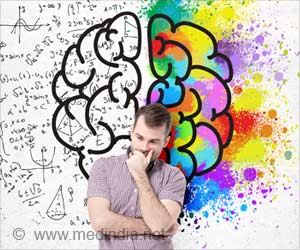- Teaching Critical Thinking and Problem Solving Skills - (https://dme.childrenshospital.org/wp-content/uploads/2019/02/Optional-_Teaching-Critical-Thinking-and-Problem-Solving-Skills.pdf)
- Critical Thinking Open University - http://www.openuniversity.edu/sites/www.openuniversity.edu/files/brochures/Critical-thinking-Open-University.pdf - (https://dme.childrenshospital.org/wp-content/uploads/2019/02/Optional-_Teaching-Critical-Thinking-and-Problem-Solving-Skills.pdf)
- Critical Thinking Workbook - https://www.schrockguide.net/uploads/3/9/2/2/392267/critical-thinking-workbook.pdf - (https://dme.childrenshospital.org/wp-content/uploads/2019/02/Optional-_Teaching-Critical-Thinking-and-Problem-Solving-Skills.pdf)
- Critical Thinking in the Classroom...and Beyond -https://files.eric.ed.gov/fulltext/EJ1143316.pdf - (https://dme.childrenshospital.org/wp-content/uploads/2019/02/Optional-_Teaching-Critical-Thinking-and-Problem-Solving-Skills.pdf)
- Developing Critical Thinking Skills - https://www.nhadulted.org/wp-content/uploads/2019/02/A11_Developing_Critical_Thinking_Skills.pdf - (https://dme.childrenshospital.org/wp-content/uploads/2019/02/Optional-_Teaching-Critical-Thinking-and-Problem-Solving-Skills.pdf)
- Critical Thinking - What It Is and Why It Counts - https://www.insightassessment.com/wp-content/uploads/ia/pdf/whatwhy.pdf - (https://dme.childrenshospital.org/wp-content/uploads/2019/02/Optional-_Teaching-Critical-Thinking-and-Problem-Solving-Skills.pdf)
- Critical Thinking Review - Final -https://images.pearsonassessments.com/images/tmrs/CriticalThinkingReviewFINAL.pdf - (https://dme.childrenshospital.org/wp-content/uploads/2019/02/Optional-_Teaching-Critical-Thinking-and-Problem-Solving-Skills.pdf)
About
Critical thinking is all about thinking clearly plus rationally understanding the logical connection between all possible ideas. Critical thinking is a crucial and critical subject of debate plus thought since the times of early Greek philosophers, such as Plato and Socrates. It has continued to be a subject of discussion, right up to the modern age. For instance, critical thinking is helping to recognize fake news.
Be an active learner rather than a passive recipient of any form of information. Critical thinkers question ideas plus assumptions, rather than just accepting them at face value. Critical thinkers first identify, then analyze, and finally solve problems systematically rather than solely relying on intuition.
Salient Features of a Critical Thinker
Someone with critical thinking skills possess the following:
- Capability to think about an issue in an objective and critical way
- Understand the accurate connections between the ideas
- Determine the importance and relevance of the arguments and ideas
- Recognize and appraise the arguments
- Identify the inconsistencies and errors in reasoning
- Approach problems in a more consistent and systematic way
- Reflect on the justification on their own assumptions, beliefs and values
- Recognize the different arguments in relation to a particular issue
- Evaluate a point of view to determine its strength and validity
- Recognize any form of weakness in the evidence
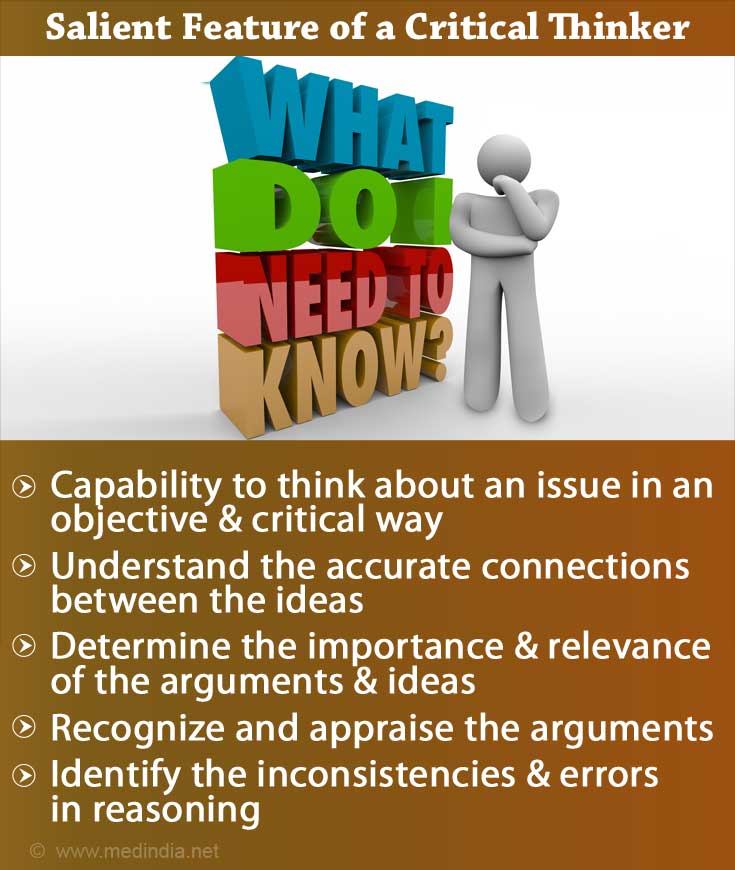
Do you often think of something that someone has recently told you about? Then ask yourself the following questions:
- Who has said it?
- Was it someone you know?
- Someone in a position ofpower?
- Does it actually matter?
- What did they happen to say to you?
- Did they ever give you facts or opinions?
- Did they provide all the facts?
- Did they ever leave anything out?
- Where did they actually say it?
- Was it in public or in private?
- Did other people have a fair chance to respond and provide an alternative stance?
- When did they go on to say it?
- Was it essentially before, during or after an important event?
- Is the timing so very important?
- Why did they even say it?
- Did they explain the concise reasoning behind the opinion?
- Were they inherently trying to make someone look good or bad?
- How did they say it then?
- Were they happy or sad, angry or indifferent?
- Did they write it or say it?
- Could you understand what was said?
What are you aiming to achieve here?
One of the most essential aspects of critical thinking is all about what you actually decide to achieve and then make a concrete decision based on the same.
Once you have clarified that aim indicative towards yourself, you must use it as the starting point in all future situations requiring thought, possibly for making any further decision-making as well. Wherever needed do make your workmates, family or those around you completely aware of your intention to pursue this very goal.
You must also discipline yourself to keep a track until the changing circumstances mean you have to revisit the beginning of the decision-making process. However, there are particular things that do get in the way of simple decision-making.
We all carry with us a range of likes and dislikes, learned behaviors, and personal preferences developed throughout our lives, which are all the hallmarks of being human.
A major contribution is about ensuring we think critically of being completely aware of the personal characteristics, solid preferences, and unwarranted biases. Then make an allowance for them when considering the possible next steps. This could be at the pre-action consideration stage caused by an unexpected or unforeseen impediment towards continued progress.
The point to note is that the more we become aware of ourselves, our strengths and weaknesses, the more likely our critical thinking will tend to be productive and immersive.
Characteristics of Critical Thinkers
This will help us in identifying who we are at the moment and where we can possibly be. Intuition is very trustworthy after you have deeply probed to gain complete information and insight.
Critical thinkers happen to think clearly and rationally, making logical connections between ideas as well. They are very crucial towards exploring and understanding the world that we live in.Critical thinkers like Marie Curie, Albert Einstein, and Sigmund Freud have shaped modern lives.
Critical thinkers are totally focused on upgrading their knowledge, and they engage in independent self-learning too. In fact, they happen to make some of the best leaders, because they can go on to reach new planes of self-improvement along with self-actualization.
In order to attain the full potential as a critical thinker, the following characteristics should be inculcated:
- Observation: This is one of the earliest critical thinking skills that is learned from childhood. This allows us to perceive and more so, understand the world around us. Careful observation is about our ability to document the details, and also about collecting data through our senses. Such observations will eventually lead to greater insight and a deeper understanding of the world in any given context.
- Curiosity: This is a hardcore trait of successful leaders.It showcases being inherently inquisitive and interested in the world, which is a hallmark of leaders who are definitely critical thinkers. Curiosity also forces you to keep an open mind and propels you to gain deeper knowledge, all of which are also fundamental and essential for being a lifelong learner.
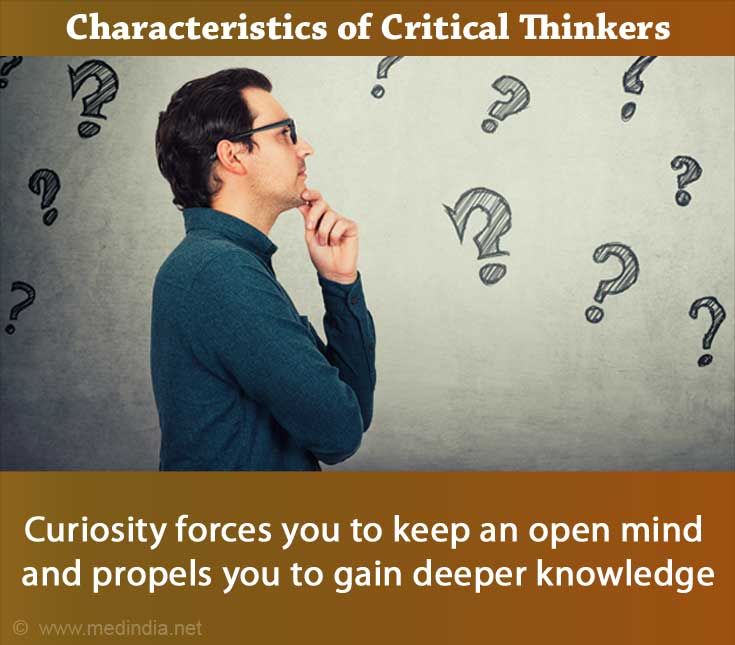
- Introspection: This is the art of being completely aware of your thinking. Critical thinkers need introspection in order to be aware of their own degree of alertness and attentiveness. Then there will be a check on their own biases too. Introspection is closely related towards the self-reflection, which gives an insight into your emotional plus mental state.
- Analytical thinking: Do note that it is the best analytical thinkers that are also critical thinkers, and vice versa. The ability to analyze information is essential when looking at almost anything, whether it is a contract, business model, or even say a relationship. Analysisrelies heavily on observation; gathering and evaluating evidence so one can come towards a meaningful conclusion. Analytical thinking always begins with objectivity.
- Objectivity: Good critical thinkers are able to stay objective when looking at an information or a situation. They focus on the facts, as well as the scientific evaluation of all the information that is at Objective thinkers keep their emotions from affecting their judgment. Being well-aware of the biases is about being objective, followed by looking at an issue dispassionately. Once you are able to remove yourself from the situation, you can even thoroughly analyze it.
- Humility: This is about acknowledging one’s own shortcomings and then identifying one’s own positive attributes in a correct way. When you have utmost humility, you are not only aware of all the flaws, but also the strengths, and this is a very important element towards critical thinking and being totally willing to stretch and open your mind. When reaching towards an intellectual humility you are open to other people’s view points too; you even recognize when you are wrong and are willing to challenge your beliefs when totally necessary.
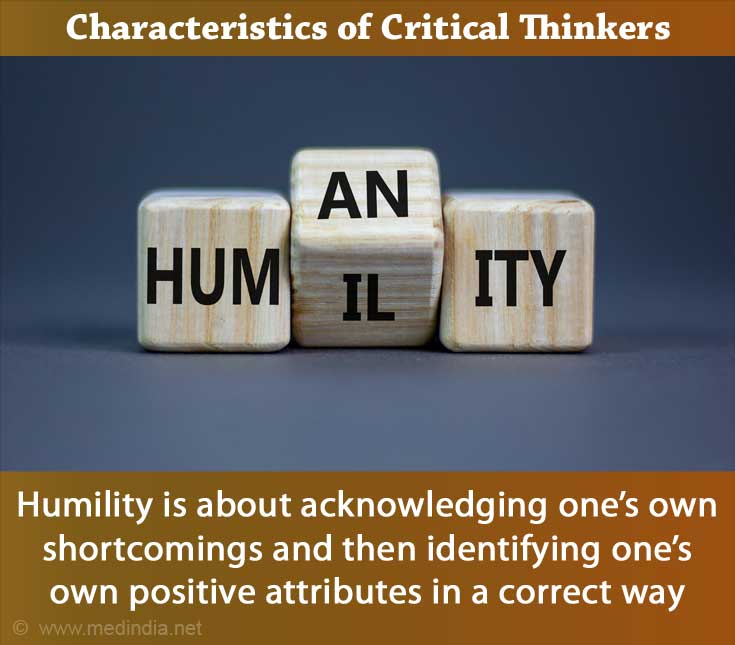
- Willing to challenge the status quo: Critical thinkers often look for smart, thoughtful answers and methods that take into account all the current, relevant information and practices that are available. Their categorial willingness to challenge the status quo may seem to be controversial, but it is a crucial part of the creative and innovative mind of a critical thinker.
- Open-mindedness: Taking a step back from a situation and not getting embroiled and enmeshed in it, helps critical thinkers to see the broader view of life. Critical thinkers ensure avoiding launch into a frenzied argument or even taking up sides; they want to hear all the possible perspectives. Critical thinkers never jump to conclusions. They always approach a question or situation with an open mind and embrace other opinions and views.
- Determining relevance: One of the most challenging parts of thinking critically is about figuring out what solid information is the most relevantand meaningful for consideration.You will be certainly presented with all the information that may seem valuable, but it may eventually turn out to be only a minor data point to contemplate on and consider.
- Compassion and empathy: Having complete compassion and empathy may seem like a total negative for critical thinkers. It is about being emotional and that can skew our perception of a situation.The point of having compassion is about having a concern for others and about valuing the welfare of other people. Without compassion, it would be very easy to allow our cynicism to become totally toxic, and to be suspicious of everything we can possibly look at. In order to become a critical thinker, we must take into account the human element too. It is vital that everything we do is about the detached data and the information which is all about people.
- Effective communicators: In several cases, problems with communication is based on an inability to think critically about a situation oreven look at it from different perspectives. Effective communication starts with a clear thought process.Critical thinking is the tool we use in order to coherently build our thoughts and express them. An effective critical thinker must be able to relay his or her ideas in a highly compelling way and then absorb and engage in the responses from others.
- Active listeners: Critical thinkers don’t just want to get their point across to others, but also engage in active listening and really hear others’ points of view as well. Instead of being a passive listener during a conversation, they actively try to participate. They often ask questions to help them distinguish the facts from the assumptions. They gather information and seek to gain insight by asking the open-ended questions that probe deeper into a problem
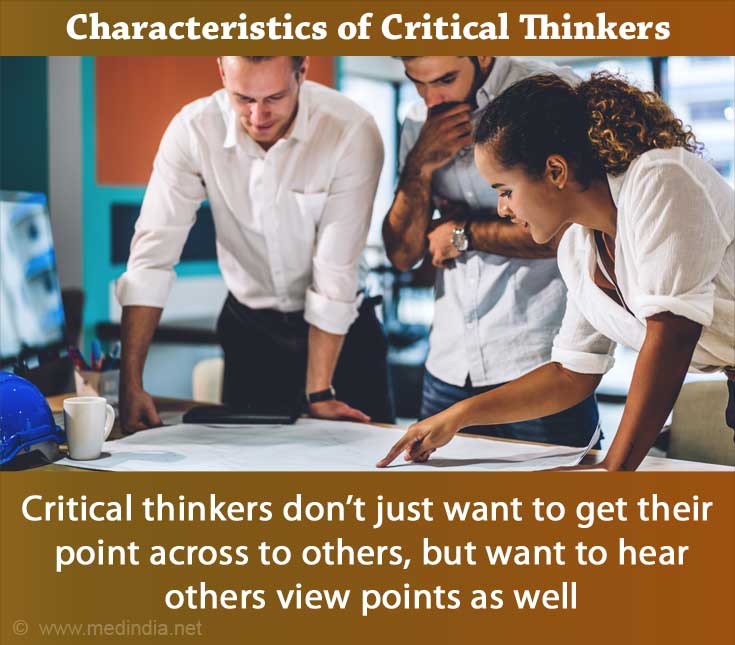
Summary
Critical thinking is about attaining best possible results. It must include assembly and evaluation of the information from as many different sources as possible. Critical thinking needs a clear, painful calculation of personal strengths and is indicative of weaknesses and likings. It is also imperative to influence decisions people may tend to take. Critical thinking requires the expansion and use of prudence.
Critical thinking reviews the results of the application of decisions made and implementing change wherever possible. It might even be a thought that we are over extending our specific demands on critical thinking. This may be because we are expecting that it can help in constructing the focused meaning rather than examining the information. It also depends on the knowledge we have acquired to see, considering we can necessarily construct a meaning that will be acceptable and useful.
Almost no information we have available to us, either externally or internally, carries any guarantee of its appropriateness and evaluation. Step-by-step instructions provide some sort of basic understanding of critical thinking that can blossom and flourish. However, it does not and cannot provide any assurance or guarantee of certainty and longevity.





